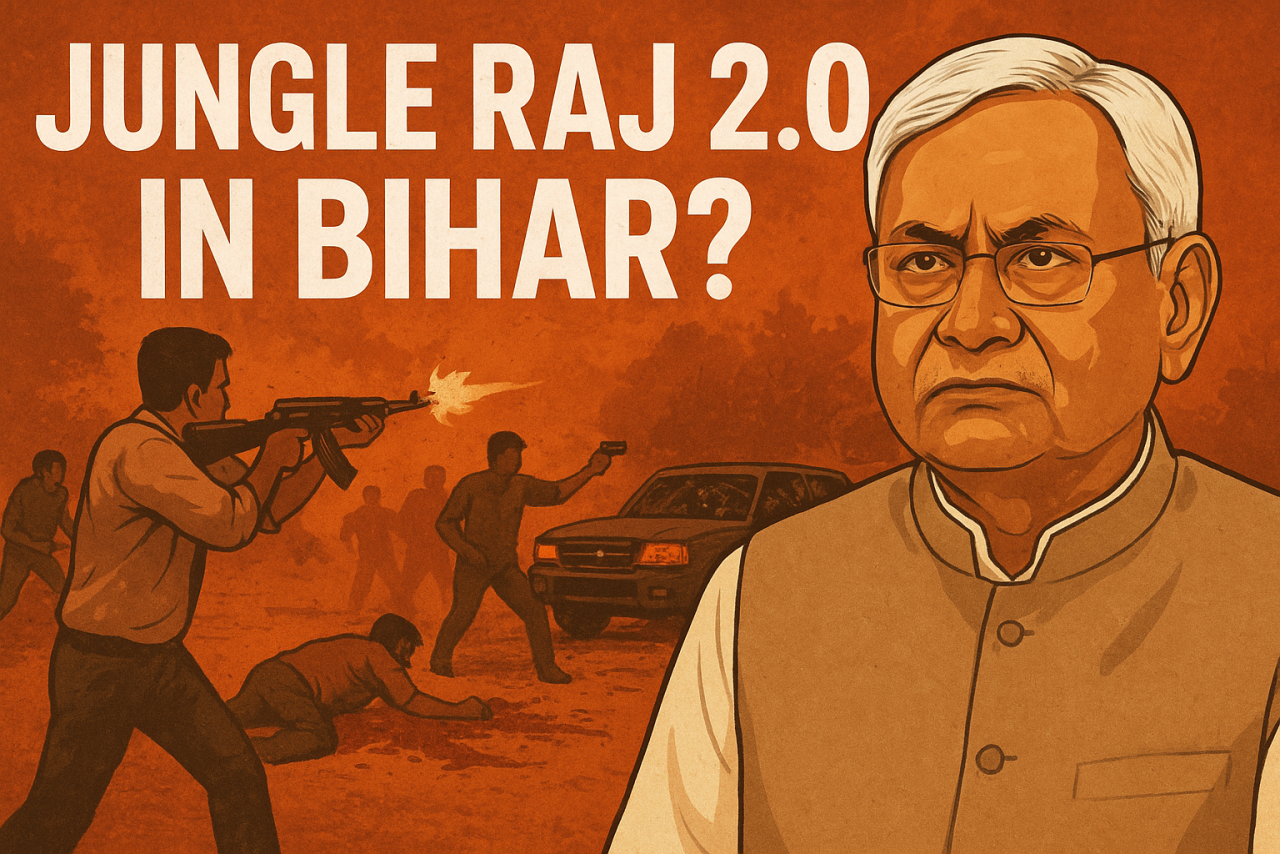
There are phrases that never quite die in Indian politics, and “jungle raj” is one of them. For most Indians, the term instantly evokes Bihar of the 1990s — a time when law and order were almost irrelevant, when muscle power mattered more than merit, and when the pistol often spoke louder than the ballot.
For years, Nitish Kumar built his reputation on the promise that he had ended that dark chapter. He became the symbol of “sushasan,” or good governance, the man who restored order after years of chaos. But what happened in Mokama over the past few weeks suggests that the ghost Bihar thought it had buried may be returning to life.
A Familiar Story, Told Anew
Mokama has always carried a certain infamy in Bihar’s political folklore. It was once ruled by strongmen who blurred the lines between politics and crime. Today, it has become the unlikely center of Bihar’s 2025 political storm.
It began, as such stories often do, with violence. During campaigning, a convoy clash turned deadly. Dularchand Yadav, a 76-year-old local heavyweight linked to the Jan Suraaj Party (JSP), was shot dead. The accused? Supporters of Anant Singh, a name that has long cast a shadow over Bihar’s politics.
The Election Commission acted swiftly, transferring officers and ordering weapon seizures. Yet the damage both political and psychological had already been done. The images from Mokama, filled with gunfire and chaos, could have come straight from the Bihar of the 1990s. The “new Bihar” Nitish Kumar once showcased to the world suddenly looked like the ghost of “jungle raj”.
The Return of the Bahubali
Anant Singh, at the center of the controversy, is hardly a new name. Once called “Chhote Sarkar,” he has walked the fine line between power and notoriety for years. To his followers, he is a Robin Hood figure who delivers when the state fails. To his critics, he represents everything that once went wrong in Bihar.
Despite a long list of criminal charges ranging from extortion to murder, Singh continues to wield remarkable influence. His political survival says less about his charisma and more about Bihar’s failure to separate power from fear. When men with private militias and assault rifles shape electoral outcomes, democracy turns into a contest of territory rather than ideas.
The System Strikes Back — But Too Late
To its credit, the Election Commission did not stay silent. Officers were suspended, transfers made, and the Chief Election Commissioner promised “zero tolerance for violence.” But this action came after tragedy had already unfolded.
This reactive governance is Bihar’s deepest flaw. The system does not prevent; it merely responds. Mokama’s killing was not an accident. It was a symptom of a state that has grown accustomed to looking away until the bullets start flying. The continued rise of men like Anant Singh is a warning that administrative machinery is bending under the weight of political patronage and fear.
Jungle Raj 2.0 — The Subtler Kind
Calling today’s Bihar a return to the jungle raj of the 1990s may sound dramatic. Kidnappings are fewer, roads are better, and cities are no longer deserted after sunset. But what we are witnessing is a subtler version, a Jungle Raj 2.0.
Here, violence does not always erupt in the open. It hides behind caste loyalties, bureaucratic silence, and political deals. Authority is undermined not by rebellion, but by compromise — a favour granted here, a crime ignored there.
Across Bihar, the signs are visible. In Mokama, a political rally becomes a battlefield. In Begusarai, armed convoys move unchecked. In Nalanda and Gaya, voters whisper about intimidation. The worst part is not that these things happen, but that they no longer shock anyone.
The Political Irony
The irony could not be sharper. Nitish Kumar’s entire career was built on opposing Lalu Prasad Yadav’s “jungle raj.” Yet under his leadership, in a coalition that shifts alliances as easily as colours on a chameleon, the same forces he once fought now seem resurgent.
The BJP calls it poetic justice. The Mahagathbandhan calls it a passing phase. But for the average Bihari, it feels painfully familiar — politicians switching sides, strongmen switching parties, and the system refusing to change.
Final Take
Bihar’s development rests on a fragile foundation: the assumption that the rule of law exists. Once that assumption collapses, everything else such as investment, education, and progress, begins to crumble.
If Bihar wants to avoid slipping back, it must free its institutions from political capture. The police must act before they are ordered to. The courts must fast-track cases involving candidates. And voters must learn to distinguish between genuine strength and muscle power.
The real measure of governance is not how quickly it reacts to violence, but how effectively it prevents it. Mokama should never have happened if Bihar draws the right lessons, perhaps it never will again.
But if bahubali politics continues under new names and alliances, then “Jungle Raj 2.0” will no longer be a metaphor. It will become Bihar’s reality and this time, the state will have no one else to blame.





















